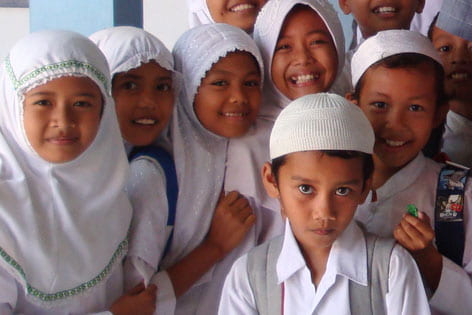Taking coping skills global
Roxane Cohen Silver and Psychology Beyond Borders provide mental healthcare in developing countries after traumatic events.

Floods, earthquakes, tsunamis, mudslides, volcanic eruptions – Indonesians have seen it all. While life goes on after such disasters survivors can bear emotional and physical scars. Now they’re getting help with healing from a UC Irvine psychologist who specializes in stress and coping.
In 2004, about 90 international experts on fear and terror management – including UCI’s Roxane Cohen Silver – met to develop strategies addressing the trauma associated with terror attacks. From this meeting, Psychology Beyond Borders was organized. Its goal is to research, educate and influence policy in areas affected by disaster, terrorism and armed conflict. Since 2006, teams have traveled to Sri Lanka, Pakistan, Uganda and Indonesia.
Cohen Silver, who serves on Psychology Beyond Borders’ board of directors, and Edwin Tan, UCI psychology and social behavior graduate student, are teaching coping skills to about 400 adults and their children in Yogyakarta, Indonesia. The province was hard hit in 2006 by a 6.3-magnitude earthquake that killed nearly 6,000 people, and many survivors have symptoms of posttraumatic stress disorder, such as anxiety and sleep problems.
The families are learning how to manage fear, and are given information on how to react calmly in stressful situations. Researchers work with them to recognize behaviors or actions that hinder coping.
“The goal is to help people deal with their emotions and identify factors that facilitate or hinder coping,” says Cohen Silver. “Coping with disaster is a family issue, and we’re interested in the role parents play in helping their children deal with it.”
The project has special significance for Tan, whose parents were born and raised in Indonesia. “Knowing the culture and language definitely has helped our work,” he says.
Survivors of natural disasters, Tan says, often exhibit behavioral problems – running away from loud noises, for example. Psychology Beyond Borders is coaching them how to respond to these experiences.
“Indonesians tend to avoid outwardly showing their emotions and often repress their feelings,” Tan says. “We give them an opportunity to talk about these things if they need to.”
In addition to helping heal psychological scars from the past, the project strives to prepare people for potential future events.
“Disaster is part of their world,” says Cohen Silver. “We hope to teach the families how to deal with the constant threat of disaster, but also how to cope with likely future exposure.”